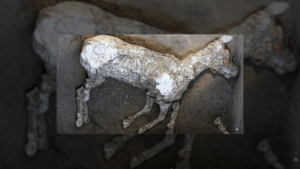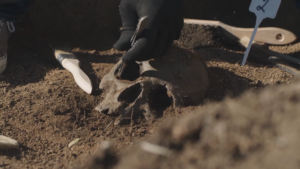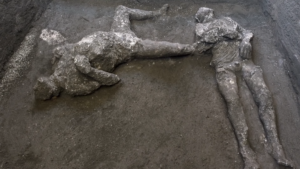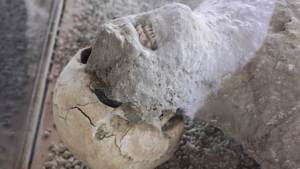In the grand tapestry of human history, there are moments that challenge our understanding of the past, forcing us to rethink our assumptions. From an eerie death pit in France to the revelation of advanced tools in India, these shocking discoveries have rewritten the narrative of ancient civilizations. Join us as we delve into the depths of history and uncover the secrets that have left archaeologists worldwide in awe.

1. **The Grisly Death Pit:**
In 2012, a routine property development project in France unearthed more than just artifacts—it revealed an ancient pit of death hidden just six feet underground. Skeletal remains, severed arms, and fingers told a haunting tale of torture and mutilation. The bones, over 5000 years old, sparked theories ranging from criminal punishment to ancient human sacrifice rituals. This macabre discovery sent shivers down the spines of researchers, challenging our preconceived notions of the past.

2. **Tragedy Frozen in Time:**
In the ruins of Pompeii, archaeologists discovered the remains of ancient horses and a saddle, shedding light on the catastrophic eruption of Mount Vesuvius in 79 A.D. The horses, victims of one of the deadliest volcanic eruptions in history, were preserved in stunning detail. The find not only deepens our understanding of the tragedy but also provides insights into how animals were treated by their owners during this calamitous event.

3. **Advanced Tools Rewriting History:**
A groundbreaking discovery in India unveiled a treasure trove of stone tools dating back a staggering 300,000 years. These artifacts, older than any previously found in India, challenge the conventional timeline of human evolution. Questions abound: Were these tools crafted by a pre-modern human species, or did modern humans reach India far earlier than previously believed? The search for answers continues, promising to reshape our understanding of ancient human capabilities.

4. **Göbekli Tepe: A Temple that Rewrote Civilization:**
In Turkey, archaeologist Klaus Schmidt stumbled upon a mountaintop mystery—an ancient settlement called Göbekli Tepe. Over 11,000 years old, it boasts massive stone structures with elaborate carvings, challenging the belief that organized religion arose only after settled agriculture. Recent revelations of permanent settlements and advanced tools surrounding Göbekli Tepe have transformed our understanding of early human societies, suggesting a transition from nomadic life to permanent settlements.
These shocking discoveries are windows into our past, challenging established narratives and inviting us to reconsider the complexities of ancient civilizations. As ongoing excavations and research continue to unravel the mysteries, the stories told by these artifacts serve as a testament to the ever-evolving nature of historical understanding. History, it seems, is not a static account but a tapestry woven with threads of discovery and revelation.




